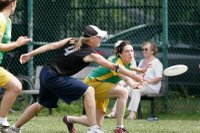One of the interesting aspect of coaching an Ultimate team is the lack of age difference between player and coach. The reality is the coach usually is more of a captain/player and is a peer. One aspect of this position is how to get a team to do something along the lines of a forced goal.
For example, I've previously talked about the importance of arriving early on a tournament day to be able to have a good warmup. I've been in situations where a team has a really tough time doing this (including the captain himself). One solution that I think might help achieve these goals is a bit of punishment.
Now how do we add punishment to a team? First off, the is little room for negative approaches to dealing with individuals and team play; I'm all for a positive environment. Once in a while, though, a team needs a little bit of an extra push to achieve a logistic goal when willpower doesn't seem sufficient. This is where a punishment can be added.
I think a punishment statement needs to be drafted for the entire team, and more importantly, the entire team needs to believe in the goal, and will accept the punishment even if one individual doesn't achieve the goal. The benefit of this type of setup is that each individual feels responsible for his/her team members. In the case of our example, the team might agree that we as a team are allowed to do whatever we want at night as long as we get to the fields 1 hour before game time. If anyone misses the 1 hr time (without a great excuse), then at the next tournament a curfew is set.
It is also possible to have individual punishments for team goals. For example, I like the concept of the attendance jar where everyone who misses a practice and tournaments puts in a few dollars. That money either goes to the team funds to reduce some costs for attending players.
In both punishment strategies, I have to emphasize that it is key that the team (80% majority) agrees on these concepts and it is not just enforced by the coach/captain. These goals are team goals, and a punishment is only necessary to help our willpower. We are adults.
When should punishment be applied to a team? In this case, I feel that punishments should only be used to enforce elements of team order that are important to the team. For example, attendance, being on time, practicing efficiently, volunteering, and following other logistic rules. Team punishments should be carefully used when it comes to performance. In these cases, the negative aspects of a punishment don't provide any benefit other than adding an additional element of concern to an already difficult task.
Finally, what type of punishments would be useful? My two main ideas are the small financial penalty and the institution of a curfew. I would be interested in other ideas.
PJ



1 comments:
There is the "feeling the burn" rout. This one is pretty drastic but can seriously get the message across if there are specific players that are having issues with coming out to practice.
Divide the whole team into groups of two, these two will be partners all season long. The penalty for not coming to a practice is that whatever you would have been doing that practice, your partner has to make up. Usually this hits hard for doubling sprints and other exhausting exercises. After a while players understand that not coming to practice is not only hurting yourself but it is also hurting your team. And being bitched out by and angry sore teammate is a lot more motivating than an annoyed captain.
Post a Comment